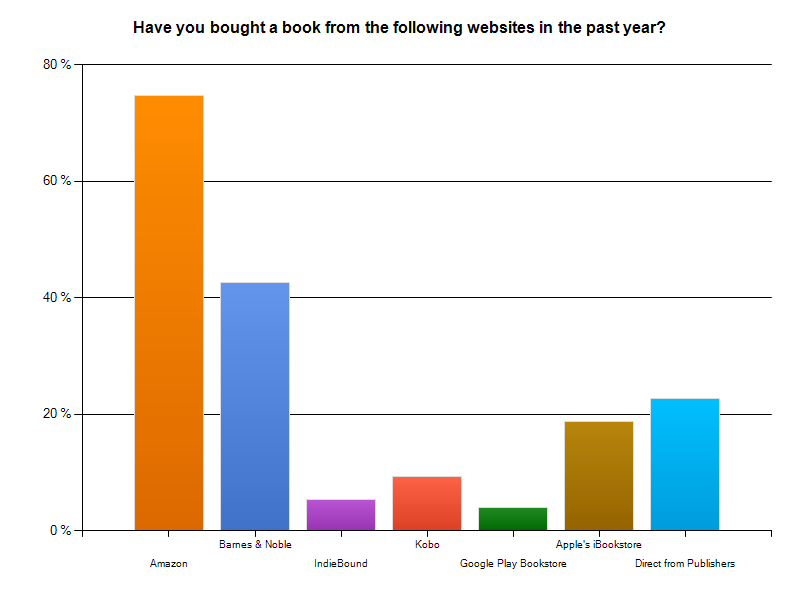Codex’s recent reader poll shows that the Amazon-Hachette contract negotiations may be having an impact on the way the average consumer purchases books. According to Codex, 39% of their respondents are aware of the ongoing negotiations between Amazon and Hachette, and there has been a decline in consumers buying books from Amazon at a rate of 7.5%.
Since publishing professionals are not quite the average book consumer, Publishing Trends conducted a quick, informal survey on where publishing professionals get their books and whether or not that has changed over time. The Amazon-Hachette negotiations were not mentioned anywhere in the survey because we did not want to lead answers toward a particular direction. Most (20%) of the survey respondents who identified their job titles were from editorial backgrounds. The next most popular category of respondents were from literary agencies at 10.8%, and the rest ranged from production, consultants, rights, marketing, and contracts.
Of those who responded, 67.9% stated that they pay for the books that they read in their free time, and the others who get them for free receive them from a variety of sources (respondents could pick multiple choices):
The variety of places respondents bought books from within the past year was also diverse, including a notable 21.6% who bought books directly from the publisher.
We asked if respondent’s book buying habits had changed over the past year and 51.2% indicated that they had.
When asked why their buying habits had changed, 41.7% of all the comments noted that they were no longer buying from Amazon, many naming the ongoing dispute as the reason why. As one respondent said, “Though I have always tried to buy from local bookstores more than online/Amazon, I have been making a conscious effort to not buy from Amazon at all, given recent developments.” Another respondent weighed in, “Even when it’s the easiest cheapest way I won’t use Amazon anymore.”
While it’s not likely that those boycotting its books correlates to a major drop in Amazon revenue—in fact, that’s higher than ever—quarterly losses at the company were up dramatically, so perhaps our publishing respondees are harbingers of a larger trend.
Many of those surveyed mentioned they have been striving to buy more from independents – when they can find them. Said one person: “I try to support the independent bookstore in my city, but it is less convenient now that two of their storefronts have closed within the last few years. Thankfully I’ve been lucky enough to find quite a few library book sales.” One respondent even commented that his/her buying habits haven’t changed, but the physical store has: “[I] shifted stores, but only from independent to independent because the first independent went out of business.”
Still, especially as people shift to reading more digitally, Amazon has proved harder to avoid. “I will download literary books to read in my Kindle app on my Ipad,” said one survey-taker. Said another, “[I] cut out Amazon, but still buy from Audible because I have a subscription.”
As we are often hear, publishing is an ever changing industry, right down to where those in the business get, or buy, their books.







